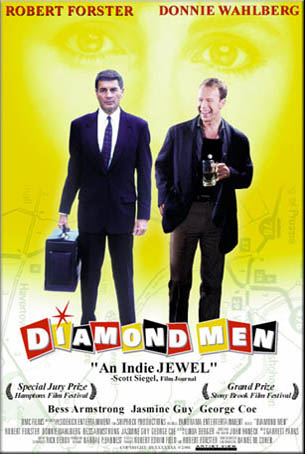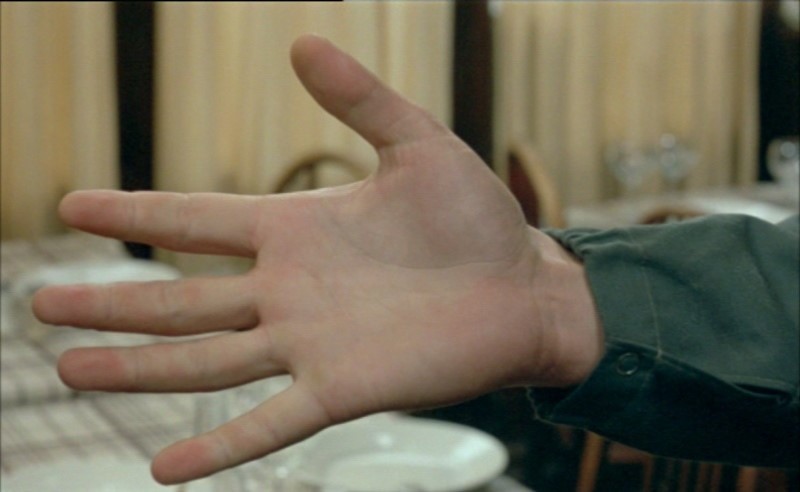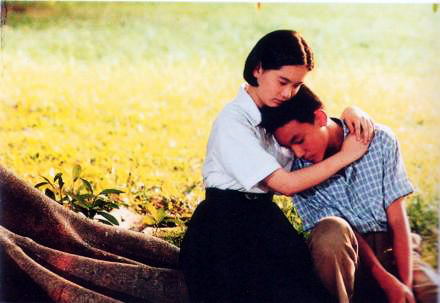From the Chicago Reader (February 1, 2002). — J.R.

Diamond Men
*** (A must-see)
Directed and written by Daniel M. Cohen
With Robert Forster, Donnie Wahlberg, Bess Armstrong, Jasmine Guy, George Coe, Jeff Gendelman, Nikki Fritz, and Shannah Laumeister.

It’s astonishing how few Hollywood movies tell us anything about the way we spend a third or more of our lives — at work. Maybe this is because the standard industry perception is that people don’t like to think about that part of their existence when they go to movies, that people want to keep their professions and pleasures separate and mutually alienated. The assumption seems to be that work isn’t supposed to be fun but movies are.
Since I don’t have this bias, I found myself uncommonly excited watching Diamond Men, an independent first feature by writer-director Daniel M. Cohen that stars Robert Forster and is playing this week at the Music Box. I have no particular interest in the diamond trade, but I was thrilled to have the opportunity to see a movie that taught me something about what it’s like to drive through small towns in Pennsylvania selling diamonds to jewelry stores — especially since its lessons are being propounded by someone as knowledgeable about the subject as Cohen (who, reports Philadelphia Inquirer film reviewer Carrie Rickey, is a third-generation diamond man from Lancaster) and articulated by an actor as likable as Forster. Read more
From the January 26, 1996 issue of the Chicago Reader. — J.R.

Films by Robert Bresson
By Jonathan Rosenbaum
Two types of film: those that employ the resources of the theater (actors, directors, etc.) and use the camera in order to reproduce; those that employ the resources of cinematography and use the camera to create….Cinematography: a new way of writing, therefore of feeling. — Robert Bresson, Notes on Cinematography
Among the people of my acquaintance who know a lot about film, most — perhaps all — consider Robert Bresson the greatest living filmmaker. Because he’s in his early 90s, the possibility of his making another movie — his last was L’argent (“Money”) in 1983 — is remote. (Most biographical sources place his birthdate in 1907, but reliable informants have told me that this very private individual shaved at least a couple of years off his age some time ago, apparently to extend his credibility as a working director with insurance companies.)
In spite of its importance, his work may have difficulty surviving, because most of it doesn’t “translate” to video. The reasons are complex, but for starters I would suggest that two central factors involved are sound presence and the framed image. Read more
From the Chicago Reader (January 9, 1998). — J.R.


Do movies come from the tooth fairy? When you consider the way that they’re often treated in this culture — in particular, what films are made available and are therefore considered “important” — the working hypothesis appears to be that movies magically appear and disappear. The general idea is that the designated tooth fairies of product flow — producers, directors, distributors, exhibitors, and critics — make things happen and the only thing viewers are supposed to do is show up for the movie, rent the video, or decide to do neither.
Most viewers understandably don’t want to be bothered with the machinations that determine which movies turn up and which don’t. To tell the truth, most critics don’t want to be bothered with these matters either. But sustaining such innocence may involve too high a price. Readers who complain that 1997 was a mediocre year for movies are probably counting only the multiplex entries, only one of which made it onto my ten-best list — though why anyone would eliminate everything else in a city like Chicago remains a mystery, perhaps explainable by saturation advertising, mass-media complicity in making everything but multiplex movies look unimportant, and the supposed inconvenient locations of some theaters. Read more





